Xanadu Launches Aurora: The First Scalable Photonic Quantum Computer
Innovations and Initiatives Innovations and InitiativesPosted by NewAdmin on 2025-01-28 04:58:22 |
Share: Facebook | Twitter | Whatsapp | Linkedin Visits: 23

In a groundbreaking milestone for quantum computing, Xanadu has introduced Aurora, the world’s first universal photonic quantum computer. This 12-qubit marvel signifies a transformative step forward in quantum technology, offering a unique combination of scalability, modularity, and advanced networking capabilities.
Aurora’s design features four independent server racks interconnected through state-of-the-art photonic technology. It integrates 35 photonic chips and an astonishing 13 kilometres of fibre optics, all while operating at room temperature—a notable departure from the cryogenic environments required by many other quantum systems.
With the potential to expand to thousands of server racks and millions of qubits, Aurora positions itself as a precursor to quantum data centres equipped to tackle the most complex computational problems.
The Advantages of Photonic Quantum Computing
Aurora leverages photonics—the manipulation of light particles, or photons—as the foundation for its quantum computing and networking. This approach offers distinct advantages, including the elimination of extensive cooling requirements, enhanced processing speeds, and seamless scalability.
By utilising commercially available photonic chips produced with established manufacturing techniques, Aurora’s architecture is both innovative and practical. Its modular design is a key highlight, with each server rack operating independently while being seamlessly networked together. This design enables robust quantum operations such as real-time error correction and decoding, which are crucial for practical quantum applications.
Aurora’s photonic technology also facilitates straightforward networking, allowing for the interconnection of limitless modules. This scalable architecture is aligned with the stringent requirements of quantum clock rates and classical hardware controls, paving the way for large-scale quantum implementations.
Christian Weedbrook, Xanadu’s founder and CEO, remarked, “Photonics is the most natural way to compute and network. While we have the potential to scale to thousands of racks and millions of qubits, our immediate focus is on enhancing performance, minimising loss, and achieving fault tolerance.”
Overcoming Challenges in Quantum Computing
Aurora’s modular scalability addresses a significant hurdle in quantum computing, but achieving fault-tolerant operation remains a priority. Minimising optical loss is critical, and Xanadu is actively collaborating with foundry partners to optimise chip designs and fabrication techniques. Recent measurements of Aurora’s optical loss tolerances provide a roadmap for refining the system to meet the stringent demands of fault-tolerant quantum computing.
The Transformative Potential of Quantum Technology
Quantum computers, unlike classical systems that use binary bits, harness qubits capable of existing in multiple states simultaneously. This enables quantum systems to perform calculations exponentially faster, offering transformative potential across various sectors.
In healthcare, quantum computing could revolutionise drug discovery by simulating molecular interactions with unparalleled precision. Logistics industries could optimise supply chains to reduce costs and environmental impact, while financial institutions might enhance risk assessment and portfolio management using quantum algorithms. Additionally, advancements in AI could lead to breakthroughs in machine learning and natural language processing.
Aurora represents a crucial step toward realising these possibilities. By addressing scalability and fault tolerance, Xanadu has laid the foundation for practical quantum computing. As the company continues to refine optical loss tolerances and improve fault tolerance, the vision of utility-scale quantum systems draws closer to reality. Aurora is not just a demonstration of feasibility but a leap toward deploying quantum computing solutions in real-world scenarios.
Search
Categories
Recent News
- Hyderabad Crypto Scam: Unraveling a Multi-State Fraud
- Hyderabad's Unified Crime-Fighting Strategy: Zero Delay, One City
- Hyderabad Cracks Down on Drunk Driving: 867 Arrested
- Hyderabad Gears Up for Presidential Visit: Traffic Plans Unveiled
- Telangana High Court Scrutinizes Traffic Police Challan Practices
- Hyderabad Gears Up for Presidential Visit: Traffic Plans Unveiled
- Hyderabad's Festive Cheer Shadowed by Online Fraud Alerts
- Hyderabad's Cyber Crime Police Warn of Festive Fraudsters
Popular News
- Navigating IPO Market Dynamics Amid Volatility and Regulatory Changes
- Innovative Green Practices and Environmental Initiative
- Massive Worldwide Microsoft Outage Disrupts Multiple Sectors
- తెలుగుదేశం పార్టీ - పేదరికాన్ని నిర్మూలించడంలో వాగ్దానం
- Universities Embrace Remote Learning Technologies Amidst Ongoing Pandemic